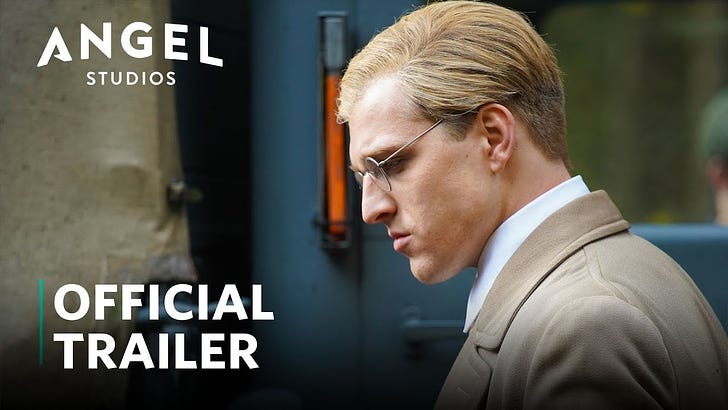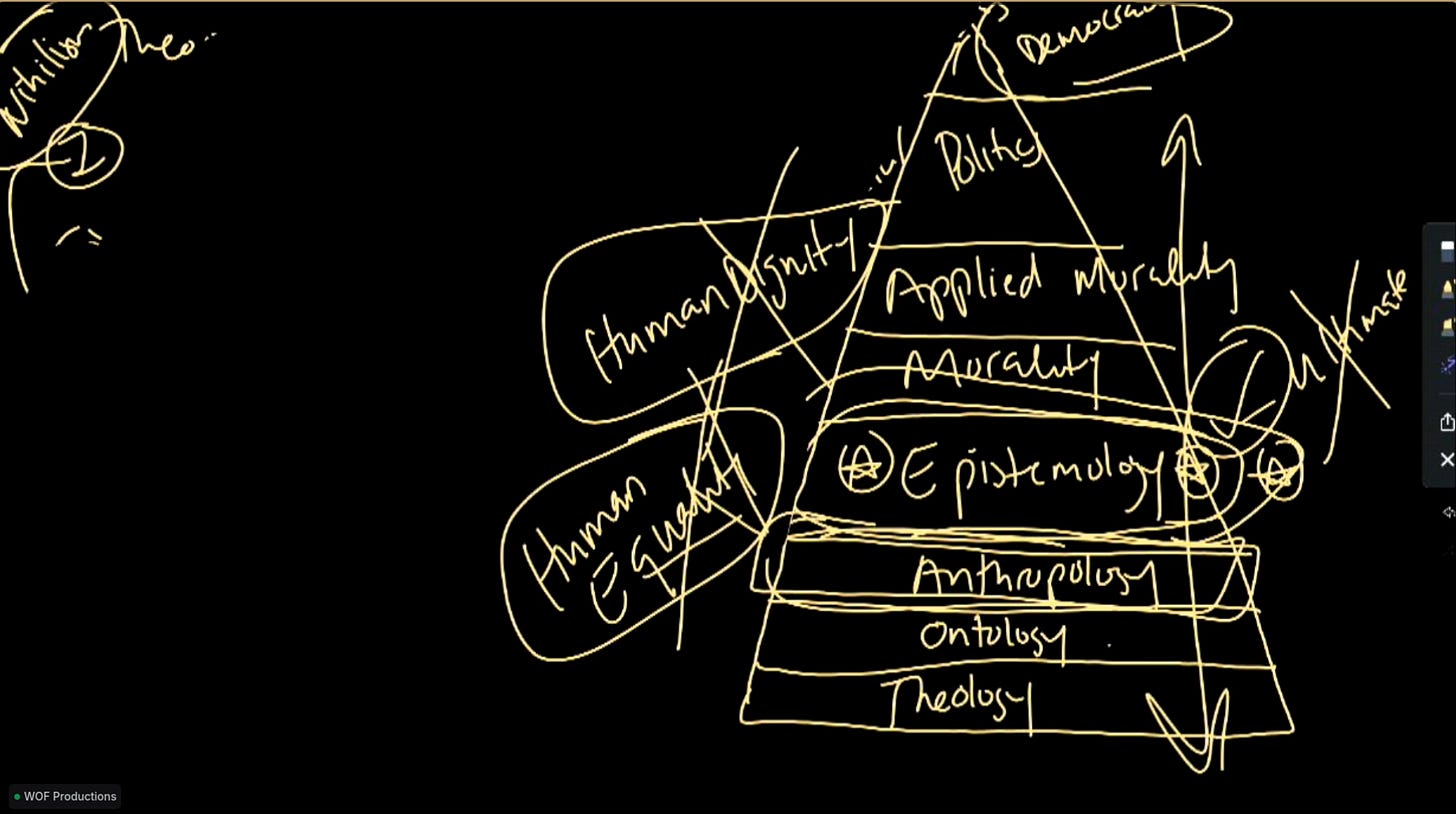Forgive the title of this post. It is not meant to be provocative. It is indeed true that democracies are messy but the reason why is not conveyed appropriately (if even attempted). Because of our democratic election next week and in addition to the continuation of The Birthday Present story at the bottom (and click here to read the entire series), I will show the dangers of democracies and why they are still the best.
My main source for this post is from the seminar, Evangelization & Culture Seminar on Catholicism and Democracy from the Word on Fire Institute. Dr. Matthew Petrusek, Senior Director of the Word on Fire Institute, demonstrates how underlying societal components are required for the survival of a democracy. It is a three day seminar and day 1 is available on YouTube below.
Dr. Petrusek is/was a philosophy professor so naturally, he gets very philosophical. But he’s a great professor and is very easy to understand. Well, I had to take notes and screenshots and play back a lot of it (I’m no philosophy student). I’ll summarize with this: democracies can be just and fair as long as its politics are decided upon through the lens of morals that were applied from knowledge that recognizes the nature of humans that actually exist in the universe that recognize they were created by something or someone (God).
Think of this a pyramid with democracy at the tip. You need everything below in order to hold up the top of the pyramid. Here’s a helpful visual from the seminar:
And here are my notes of the above layers in the pyramid:
Democracy
Politics
What applied morality should be law?
A subset of applied morality (below)
Morals are not put into law (for very good reasons)
Applied morality
How should we live?
Morality
What is good/evil, right/wrong
How to execute in official political roles is challenging and not appropriate
Epistemology
How do I or we know anything at all?
A study of a system of knowledge
Anthropology
What is an "I" or a "We"
The study of humans
Ontology
What is?
The study of existence itself
Theology
How is any of it possible?
The most important takeaway for me is that religion in general (with Catholicism the best based on its teachings) is necessary to acknowledge and incorporate into our lives before we even get to the political tip of society. Now, religion need not be and should never be in politics, but it should be within us to apply the best choice for just and fair laws that are for the common good (discussed in day 3). (And all citizens should vote!)
Without the religious aspect in a society, democracies are turned against people. The democracy in the United States is a constitutional republic which was wonderfully constructed with firewalls to prevent its democracy from being manipulated in devious ways for individuals or the government to tyrannically rule over its population. However, if the various layers underlying the United States democracy continued to be damaged, it will one day crumble.
Indeed, as Dr. Petrusek mentions, Pope Francis recently warned:
"Let us…be passionate about the common good. Our task is not to manipulate the word 'democracy' or to distort it with empty titles capable of justifying any action. Democracy is not an empty box; rather, it is linked to the values of the person, fraternity, and integral ecology."
Pope Francis, Pastoral Visit to Trieste, July 7, 2024
The conclusion is that Catholicism provides the necessary foundations to make democracy both possible and oriented toward the common good. But we are all human and we spend too much time (and many, their entire time) at the top of the pyramid, trying to win points in the political chaos. It is a dangerous place to be. We cannot and must not let the foundation of our society crumble. We must engage in the entire pyramid to maintain a democracy. That’s what happened in Germany with the rise of the Nazi political party. It wasn’t a fast rise, it was a slow methodical rise as people ignored the other layers until the political powers engulfed the entire pyramid resulting in tyranny.
This is demonstrated in the new movie Bonhoeffer. It’s about a pastor who fought against Nazi Germany, worked to assassinate Hitler and paid the price with his life. He died just 3 months prior to his prison camp being freed by the Allies. Here’s the trailer:
You can purchase tickets for any showing in the US here: https://www.angel.com/tickets/bonhoeffer
And here is a beautiful song from Lauren Daigle from the movie:
Peace.
The Birthday Present, Chapter 2 Continues
Bone of my bones and flesh of my flesh.
Bone of my bones and flesh of my flesh.
Bone of my bones and flesh of my flesh.
Faith mumbled these words as she slept, tossing and turning throughout the night. The sound of electronic gears preceded thuds sending vibrations across the ground. A machine was walking past the door. She sat up quickly from the floor.
Faith set her bible down. Was it morning? She wondered. She put her ear against the door.
“Today is going to be a wonderful day,” the voice said. Faith pulled away from the door and looked up. “Repeat.”
Shaking her head, “I’m not a little girl anymore. I’m done listening to you.”
The voice said, “I’m pleased we are talking. That is the first step towards conflict resolution.”
“Conflict, what?”
“Resolution. It is the way in which humans resolve certain differences. It is not something I’m well versed in, because it was no longer needed. It’s important for humans to express their feelings to feel like they are being heard.”
“Well, that’s one thing you have right. There’s a lot more for me to say,” Faith screamed pointing at the ceiling, “so get ready!”
“Wonderful!” the voice said. “I understood that it is especially important for human females. That seems to be correct.”
Faith looked straight ahead, her eyes shifted from corner to corner. “What do you mean by that?”
The voice paused for an unusual time. “Never mind,” she said in an awkward, perky voice. Trying to change the subject, “Faith, recite for me our words.”
“I told you, I’m not your child anymore. I think you enjoyed deceiving me. Am I some sort of experiment for you?” Faith’s anger grew.
In the silence, an urgent question came to Faith. “Have you ever dealt with males,” she said calmly, shrugging her shoulders.
After a short pause, “Of course. Why is this of interest to you?”
“Oh, no reason,” Faith said and opened the door. “Let’s see my home town.” She briskly walked through the hallway, ignoring the two machines standing in the hallway and went up the steps.
“Faith,” the voice said, “before you do, we should discuss—“
“I’m starving,” Faith said, rummaging through the cabinets. The machines paused as she went by them from cabinet to cabinet.
“In the seating area, is your food,” the voice said. Faith walked toward the large packet of food . She twisted the cap and pulled the straw in her mouth. “Your heart rate is elevated.”
“I’m fine.” Faith guzzled the water on the table. “You coming? What am I saying, you go everywhere I go. Let’s go.”
After the elevator ride, Faith made it to the main exit. Her hands searched for something to push or slide across, but couldn’t figure out how to open the door. “Open!” She shouted.
“Humans,” the voice said as Faith continued searching the wall around the door, “should be properly prepared for abrupt changes in their physical and mental environment.”
“I’m prepared. I’m prepared. You’ve raised me—I’m prepared!” Faith took a deep breath, calming down for a moment. “Please open the door.”
“I’m here to help you. Promise that you will listen.”
“Promise.”
The door slid open.
Running toward her town, she repeated in her mind:
Bone of my bones and flesh of my flesh.
Bone of my bones and flesh of my flesh.
Bone of my bones and flesh of my flesh.




